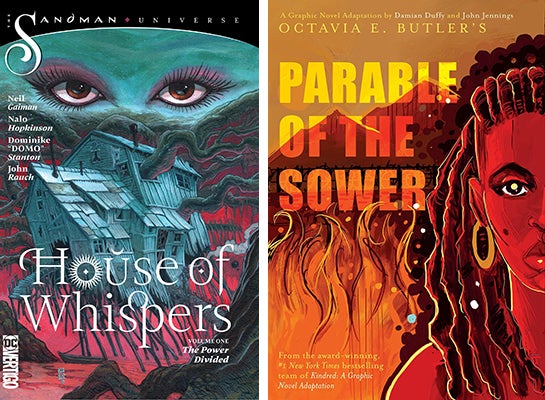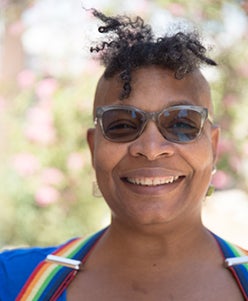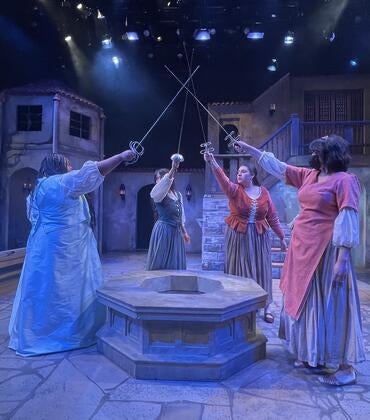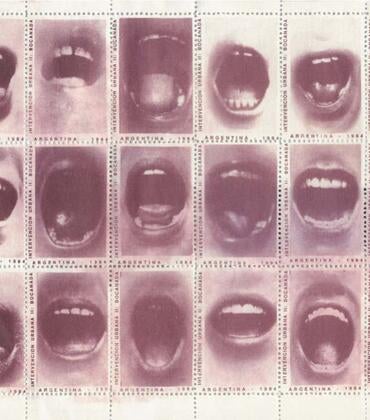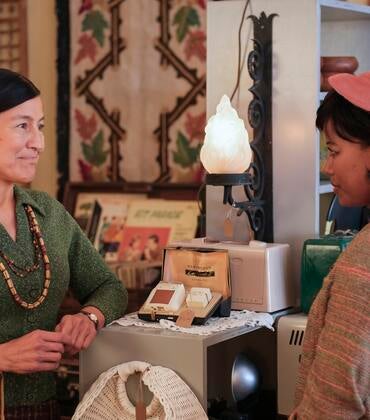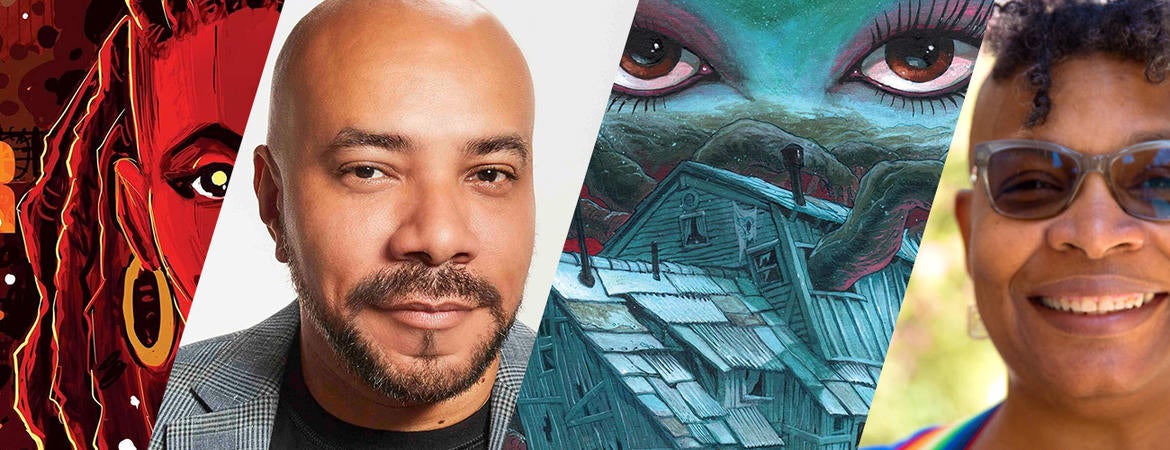
An event featuring comic creators Nalo Hopkinson and John Jennings invites attendees to join the UCR professors and bestselling authors in a conversation about their recent work and the importance of writing and art centered in Black experience.
Against the current backdrop of support for the Black Lives Matter movement, the June 25 online event “Afrofuturist Comics: Sankofa and the Black Speculative Re-Imagination,” is the first in the new “Faculty Profiles in Research, Art and Innovation” series hosted by UCR Library. The installment features Hopkinson and Jennings discussing their latest graphic novels, “House of Whispers” and “Parable of the Sower,” respectively, as well as Black speculative fiction.
“The topic is looking at the importance of dreaming and writing about Black futures and Black speculation in a time of great calamity,” Jennings said. “I don’t think people interact with comics in the way they interact with other media, so it’s kind of our way to say not only are they literature, but they’re also very topical, very timely to talk about the power of a radicalized Black imagination.”
Hopkinson’s “House of Whispers” graphic novels — volume one was published July 2019 and volume two in February — each compile six issues of her “House of Whispers” comics. Part of a new series expanding Neil Gaiman’s acclaimed Sandman Universe, “House of Whispers” centers on Erzulie Fréda, a Yoruba deity visited by the dreaming souls of Voodoo practitioners, tossed from her realm into the realm of “The Dreaming.” An accomplished science fiction and fantasy novelist, “House of Whispers” is Hopkinson’s first foray into comics.
“Parable of the Sower,” published in January, is a graphic novel adaptation of Octavia Butler’s acclaimed post-apocalyptic novel of the same name by Jennings and Damian Duffy. First published in 1993, the prescient story takes place in the early 2020s, with global climate change and economic crises leading to social chaos. In protagonist Lauren Olamina’s fight for survival, the young preacher’s daughter develops a new system of belief with hopes of saving humanity. Jennings and Duffy previously won an Eisner award for their adaptation of Butler’s novel “Kindred” and are currently at work adapting Butler’s “Parable of the Talents.”
“The two books we are looking at are similar because the protagonists are Black women and you have very strong female leads,” Jennings said. “Issues around identity and class and gender are at the forefront of both stories, but they’re deployed in very different ways.”
Discussions around both their writing and scholarship are familiar territory for Hopkinson, a professor of creative writing, and Jennings, a professor of media and cultural studies. The two work in similar genres involving science fiction, fantasy, dystopia, and horror which explore the spectrum of the Black fantastic, Jennings said. They also often work in collaboration — Hopkinson wrote the intro to “Parable of the Sower” and Jennings provided the initial sketches for one of the characters in “House of Whispers” — and have several comic projects they are currently working to produce together.
“John has been working in comics forever and has in many ways been my guide as I get into writing comics,” Hopkinson said. “We have very similar sensibilities around African-focused images of the fantastic and how they interface with the Black experience — with the Black experience of just being and the Black experience of living under racism worldwide.”
During the event, Hopkinson and Jennings will be reading from each other’s graphic novels and then opening it up to a discussion about their work and what they refer to as Black speculative re-imagination. Jennings said the voice of the African diaspora has historically been either sublimated, disrupted, or erased, and Black speculative re-imagination explores what would happen if it wasn’t.
“Most conventional fantasy is based in folklore, and a lot of it is British and European folklore,” Hopkinson added. “At some point I began to think, ‘wait a minute, I also grew up reading Caribbean folklore, where’s the literature based in that?’ so that was a jumping off point for me. A lot of my writing takes these histories and stories that the world is working to erase and puts them in the forefront — that’s kind of what we mean by re-imagination.”
At a time when the U.S. is shining a brighter light on continued oppression of Black Americans, police brutality, and persisting racial inequality, the writers note these conversations have become even more vital.
“There’s so much disruption of Black life, Black mourning, Black politics, Black everything right now that I feel like any type of stand to normalize Black experience or Black existence is in conversation with it,” Jennings said. “Both of these books deal with different types of trauma, and I think it’s more important these days for us to think about dreaming and utilizing the speculative to come up with different ways to resist what’s happening in real life.”
Jennings said art and writing has always played an important role in affecting social change, noting music, art, crafts, remixing of language, and other types of expressions have been used throughout history by descendants of slaves in America, which includes himself. He said the continued disenfranchisement of Black people in the world today has almost “forced” him to write about it, noting he feels “captive by the moment.”
“I think now, even more than ever, we need to use art to motivate people, to uplift people, but also to record the moment and by using the different modes of the genre we are working in, give us a certain amount of distance so we can understand the moment a lot better because metaphor and dreams and symbolisms speak more to reality than the actual thing,” Jennings said. “That’s how we make meaning of the world — that’s storytelling — and we’re all just stories that are being edited and reedited constantly anyway, because really what is the self but a story that we write and tell ourselves over and over again?”
“We start to feel like we don’t have time for celebration, we don’t have time for joy, we don’t have time for fiction or entertainment, but this is what we’re fighting for — we're fighting for joy, we’re fighting for the right to tell each other our stories,” Hopkinson said. “It’s why we do this, it’s getting us through this, it is essential to the human endeavor, as much as we pretend it isn’t. You take away people’s music and their movies and their games and just see how fast you have another revolution.”
The two creators also highlight the importance of amplifying art by Black creators and about Black experience while issues of systemic oppression remain in the forefront of public consciousness. Hopkinson notes oppression of Black voices is evident even in the publishing industry.
“Our art, our endeavors — everything gets silenced, gets hidden, gets minimized,” Hopkinson said. “But you have this moment where our whole world is paying attention and beginning to think about itself and its complicity, so I think this is a very important time to look at what we have to say about the world and it’s a time where more of us can get our voices heard. Now there’s this groundswell, so it is very important because people are dying out there and it’s criminal — or it should be.”
Donation to Eaton Collection
Both Hopkinson and Jennings have recently donated work to UCR Library’s Eaton Collection of Science Fiction & Fantasy, one of the world’s largest repositories of literature and materials from science fiction, fantasy, horror, and related genres. Hopkinson has donated several manuscripts and galley proofs from her science fiction and fantasy novels as well as notes, correspondence, posters, and other items related to her literary career.
“It made sense to me to house them in the university that was housing me,” said Hopkinson. “It’s such a great collection that has focused on alternative futurism — works by people of color, by queer people, by people who tend to be marginalized in the field. It also means because people are researching my practice and my work all the time, that there’s somewhere they can come look at the documents that are sort of track marks of my career.”
Jennings has donated roughly 700 illustrations, storyboards and sketches used in creation of the “Kindred” graphic novel to the Eaton, noting the additional visual ephemera can provide researchers insight to the material processes of comics creation.
“I really felt the people there will take care of the work,” Jennings said. “I know the work is important for the research here, but also it was a way to say thanks for bringing me out, because it’s been a great teaching experience.”
Event Info
Afrofuturist Comics: Sankofa and the Black Speculative Re-Imagination with Dr. Nalo Hopkinson and Prof. John Jennings
Thursday, June 25 | 4:30-5:30 p.m.
Guests must RSVP to receive the link to join the livestream broadcast. Attendees who RSVP will receive a link they can use to submit questions at least 48 hours in advance. This event is free and open to the public.
